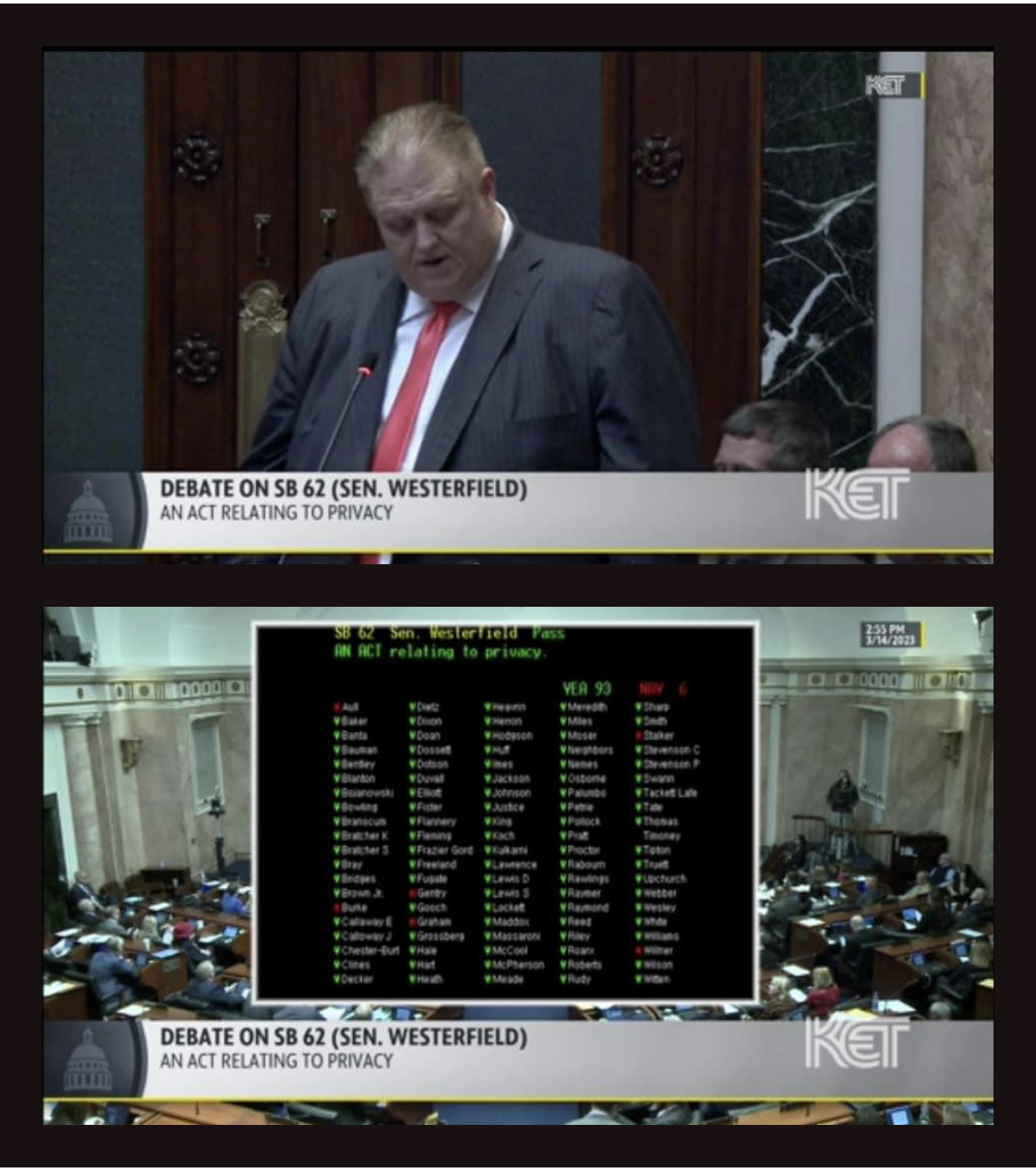
With the House sponsor’s assurance that his Senate colleague’s bill is supported by the ACLU, among others, the House of Representatives approved Senate Bill 62 this afternoon by an overwhelming majority.
https://apps.legislature.ky.gov/record/23rs/sb62.html
In what other bizarro universe but the 2023 Kentucky General Assembly would ACLU endorsement of a anti-transparency bill provide the needed legislative green light for supermajority approval?
In the vast majority of cases, lawmakers treat ACLU approval of proposed legislation as a blemish rather than a beauty mark. In the vast majority of cases, the Kentucky Open Government Coalition and the ACLU agree about threats to transparency. SB 62 is not one of those cases.
Did lawmakers ask the ACLU about its position on book banning, anti-LGBTQ, and anti-drag bills that moved through the chambers with alacrity in this session. Would ACLU opposition to those bills secure defeat?
More to the point, did lawmakers ask the Kentucky Press Association, or other open government advocacy groups — for example, the Kentucky Open Government Coalition — whether they endorse Senate Bill 62?
They did not.
Did they ask either group -- whose grasp of Kentucky's open government laws far exceeds any of the nonprofits identified as supporters and whose shared commitment to those laws is unquestioned -- about the problems with the bill, how it might lend itself to abuse, or how it will chill existing rights of access.
They did not.
Instead, the House sponsor dismissed a "couple of groups" that opposed SB 62 as "outliers," vaguely suggesting some alternative motive for their opposition but professing a reluctance to "spread rumors."
Let me disabuse the House sponsor of this notion.
The coalition's opposition is prompted by our belief that SB 62 will wreak havoc on existing open records laws.
The coalition's opposition is prompted by our concerns about the creation of yet another unnecessary and dangerous categorical exemption, as well as the wholesale abandonment of the time tested privacy analysis — even where the public’s interest in disclosure is clearly superior to the privacy rights asserted — that formed the basis of the Kentucky Supreme Court's analysis in Cape Publications v. University of Louisville Foundation (2008).
https://caselaw.findlaw.com/ky-supreme-court/1439464.html
In the University of Louisville Foundation case, the Court applied this privacy analysis to reject the non-profit foundation's privacy claims for its donors -- except for 62 donors "who requested anonymity and who made donations to the Foundation prior to it being declared a public entity" in 2003.
"Future donors to the Foundation," the Court held "are aware, and on notice, that their gifts are being made to a public institution and, therefore, are subject to disclosure regardless of any requests for anonymity."
The Court reasoned:
"It is commonplace that a charity or other organization collecting donations will publish a list of donors and sponsors as a way of recognizing those persons and advertising the success of its fundraising efforts. In fact, for some persons, the fact that his or her name will be included in a publicized list is itself an incentive to make a donation or gift to the organization. We are not persuaded that non-anonymous donors held a legitimate expectation of privacy in their donations.
"When balanced against the public's interest in disclosure, the privacy interests of the non-anonymous donors do not outweigh the need for public disclosure of these donors' identities. We agree with the trial court that the non-anonymous donors had a very minimal expectation of privacy in making the donations. Moreover, though personal in nature, the information sought by the Courier-Journal does not involve the revelation of intensely private information, such as personal income or medical history. The public, on the other hand, has a legitimate interest in the amounts and sources of monies donated to the Foundation, which ultimately fund the University. Particularly, in light of the donors' lowered expectations of privacy in this circumstance, we do not believe that disclosure of these non-anonymous donors' identities would constitute a 'clearly unwarranted invasion of personal privacy' within the meaning of the Open Records Act.”
The Supreme Court reversed the Court of Appeals as to the group of non-anonymous donors. The Court emphasized that it's "holding with respect to the anonymous donors turns primarily on the fact that each donor believed, at the time of the gift, that the donation was being made to a private entity. By virtue of the Court of Appeals' opinion, future donors to the Foundation are aware, and on notice, that their gifts are being made to a public institution and, therefore, are subject to disclosure regardless of any requests for anonymity."
Anyone who doubts the danger of abuse emanating from categorical exemptions to public records laws is no student of those laws. 98 members of the General Assembly today joined the ranks of the unschooled.


